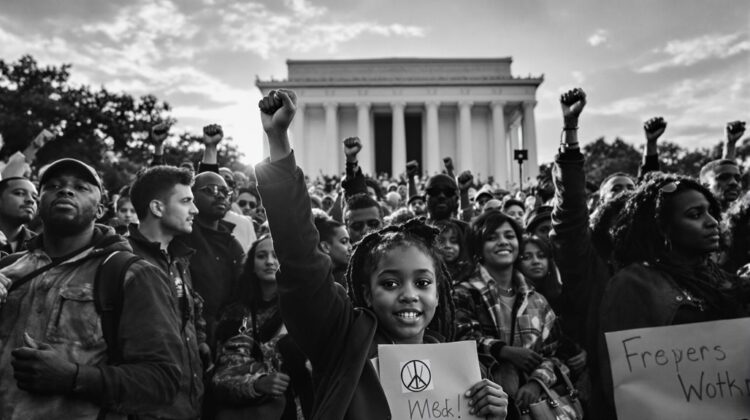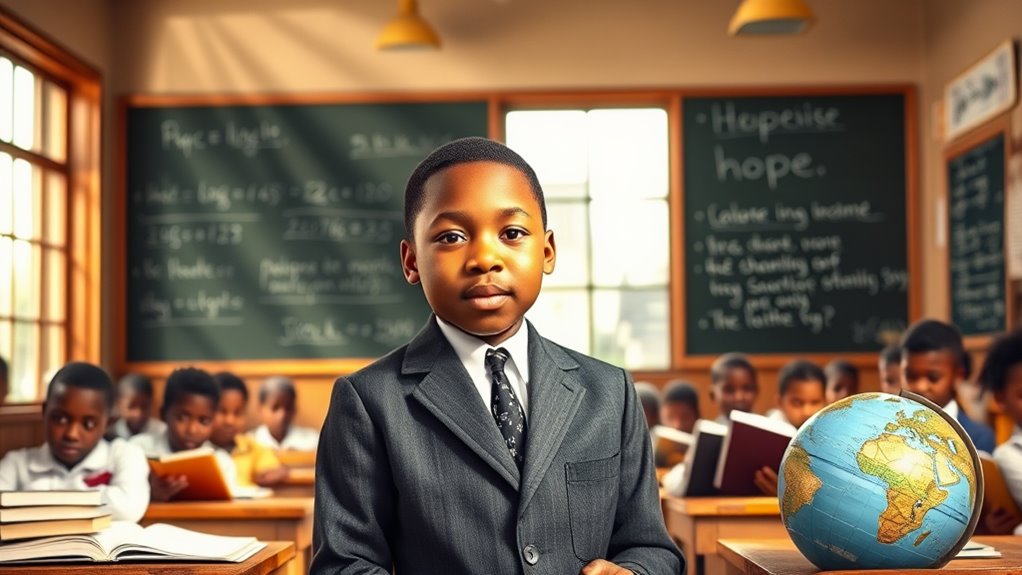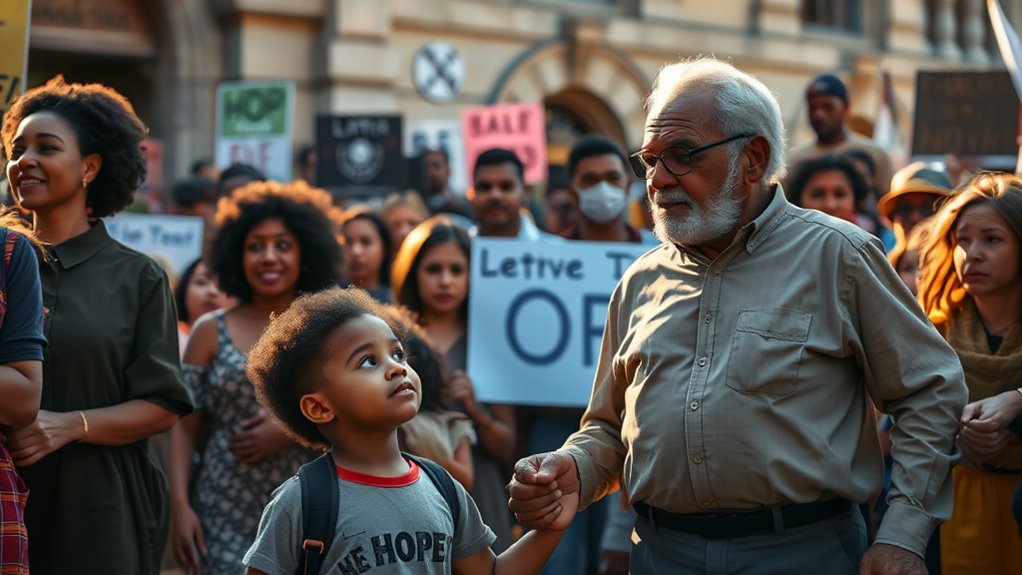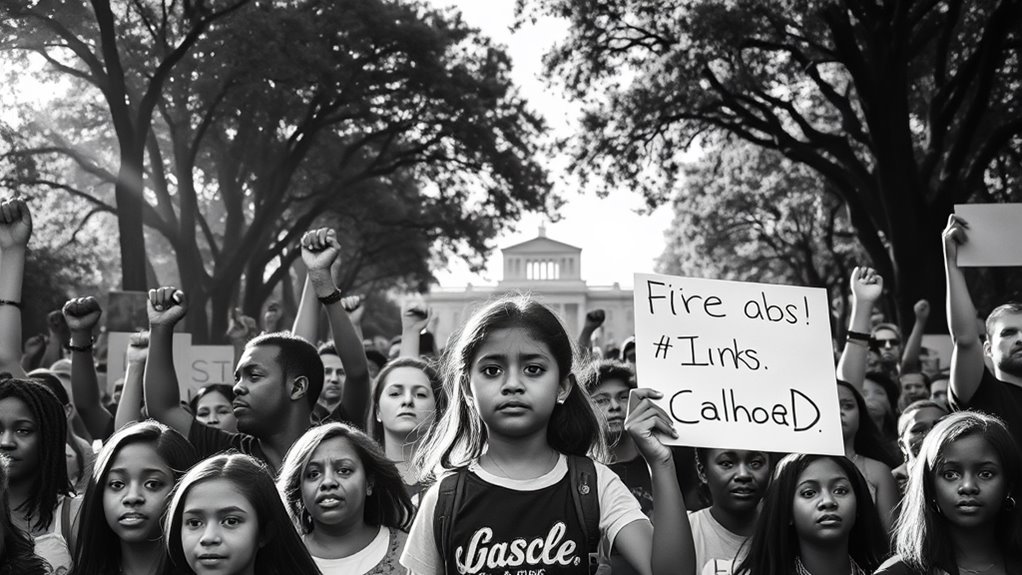
Martin Luther King Jr. fought for civil rights, social justice, and equality during the Civil Rights Movement. He advocated for nonviolent resistance inspired by Gandhi, aiming to dismantle racial segregation and discrimination. Significant events, such as the Montgomery Bus Boycott and the March on Washington, showcased his leadership and commitment to justice. His efforts led to landmark legislation, including the Civil Rights Act of 1964 and the Voting Rights Act of 1965. His enduring legacy continues to inspire movements for justice today.
Table Of Contents
Article Highlights
- Fought for racial equality and the end of segregation in public spaces, notably through the Montgomery Bus Boycott.
- Advocated for nonviolent protest as a means to achieve civil rights and social justice, inspired by Gandhi's philosophy.
- Led initiatives like the Birmingham campaign to expose racial discrimination and brutality against African Americans.
- Delivered the iconic "I Have a Dream" speech, calling for unity and justice during the March on Washington in 1963.
- Played a crucial role in the passage of the Civil Rights Act of 1964 and the Voting Rights Act of 1965.
Early Life and Education

Martin Luther King Jr.'s formative years laid the groundwork for his future role as a leader in the civil rights movement. Born into a Baptist family in Atlanta, King was deeply influenced by his spiritual upbringing. At just 15, he began his education at Morehouse College, where he earned a Bachelor of Arts in Sociology in 1948. His pursuit of knowledge continued at Crozer Theological Seminary, where he obtained a Bachelor of Divinity degree in 1951. Finally, he achieved a Ph.D. in Systematic Theology from Boston University in 1955. These academic experiences, combined with his exposure to Mahatma Gandhi's philosophy of nonviolence, solidified King's commitment to social justice, guiding his transformative activism in the quest for liberation and equality.
Joining the Civil Rights Movement
As the civil rights movement gained momentum in the mid-1950s, King emerged as a pivotal figure following the successful Montgomery Bus Boycott, which began in December 1955 after Rosa Parks' courageous act of defiance. His leadership was further solidified when he co-founded the Southern Christian Leadership Conference (SCLC) in 1957 to promote peaceful protest and rights for African Americans. King's role as pastor of Dexter Avenue Baptist Church allowed him to hone his organizational skills, emphasizing nonviolent resistance inspired by Mahatma Gandhi. His involvement in key events, including the Birmingham campaign and the March on Washington, galvanized national support for civil rights movements.
| Year | Event | Significance |
|---|---|---|
| 1955 | Montgomery Bus Boycott | Sparked national awareness |
| 1957 | Co-founding SCLC | Promoted organized nonviolent action |
| 1963 | March on Washington | Mobilized mass support |
| 1963 | Birmingham Campaign | Showcased the struggle for justice |
Nonviolent Protest and Its Impact

Nonviolent protest emerged as a defining strategy of the civil rights movement, largely influenced by the teachings of Mahatma Gandhi and championed by leaders like Martin Luther King Jr. King believed that nonviolent protest was crucial for achieving civil rights without perpetuating violence. The Montgomery Bus Boycott demonstrated the strength of organized action, successfully ending racial segregation on public transportation. His leadership during the Birmingham Campaign revealed the brutality faced by peaceful demonstrators, igniting national outrage and support for civil rights. The March on Washington, where King delivered his iconic "I Have a Dream" speech, mobilized over 250,000 people. This nonviolent approach notably contributed to the passage of the Civil Rights Act and the Voting Rights Act, proving peaceful activism could instigate profound legislative change.
Major Events and Achievements
Throughout the civil rights movement, pivotal events orchestrated by Martin Luther King Jr. both galvanized public support and resulted in significant legislative advancements. The Montgomery Bus Boycott in 1955 marked a vital victory, leading to a Supreme Court ruling against segregated seating. In 1957, King co-founded the Southern Christian Leadership Conference to champion civil rights through nonviolent means. His leadership during the 1963 March on Washington for Jobs and Freedom culminated in the iconic "I Have a Dream" speech. King's relentless advocacy was instrumental in the passage of the Civil Rights Act of 1964, and his involvement in the Selma to Montgomery marches in 1965 paved the way for the Voting Rights Act. His profound commitment earned him the Nobel Peace Prize and inspired his "Letter from Birmingham Jail."
Lasting Legacy and Inspiration

The enduring legacy of Martin Luther King Jr. resonates strongly in contemporary society, embodying the principles of justice and equality he championed. His life and work continue to serve as a significant inspiration for those seeking liberation from oppression.
| Key Contributions | Impact |
|---|---|
| Civil Rights Act of 1964 | Legal foundation for civil rights |
| Voting Rights Act of 1965 | Guaranteed voting access for all |
| "I Have a Dream" Speech | Symbol of hope and activism |
| Martin Luther King Jr. Day | Acknowledges ongoing struggle |
King's philosophy of nonviolent activism remains a guiding light for modern movements, urging individuals to rise as leaders in the fight for civil rights and social justice. His spirit endures, igniting passion for change across generations.
Frequently Asked Questions
What Did Martin Luther King Jr Do Fought for Civil Rights?
In examining Martin Luther King Jr.'s contributions to civil rights, one finds a profound commitment to civil disobedience strategies and nonviolent protest methods. His advocacy for racial equality was evident through community organizing efforts and impactful inspirational speeches. King influenced legislative change, promoting economic justice initiatives as he utilized grassroots mobilization tactics. His coalition-building techniques nurtured unity among diverse groups, creating a historical legacy that inspired future generations to pursue liberation and equality relentlessly.
What Did Martin Luther King Jr. Do in the Civil War?
In a dramatic twist of history that never was, Martin Luther King Jr. was not a soldier in the Civil War, but rather a visionary born long after the final cannon fired. His legacy impact emerged in a world shaped by the abolition movement and the Emancipation Proclamation, where African Americans continued their freedom struggle. King's relentless pursuit of social justice and racial equality echoed the courage of Union soldiers, forging a new path for liberation.
What Are 5 Things Martin Luther King Accomplished?
Martin Luther King Jr. achieved significant milestones in the fight for civil rights. He championed nonviolent protest, leading Freedom marches that inspired a movement for racial equality. His inspirational leadership facilitated community organizing efforts, promoting social justice and economic justice. King's advocacy resulted in landmark legislative change, including the Civil Rights Act of 1964. He likewise emphasized the importance of educational reform, laying the groundwork for future generations to endeavor for liberation and equality.
How Did Martin Luther King's Dream Influence the Civil Rights Movement?
Martin Luther King Jr.'s dream legacy profoundly influenced the civil rights movement, inspiring a quest for social justice through nonviolent protest and civil disobedience. His inspirational speeches rallied communities, nurturing a spirit of activism aimed at achieving racial harmony and equality. King's moral leadership galvanized individuals to confront injustice, leaving a historical impact that transcended race, uniting diverse groups in the ongoing struggle for liberation and community empowerment. His vision remains a beacon for future generations.

Leave a Reply